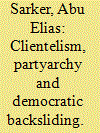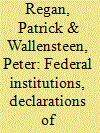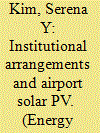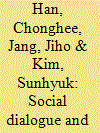| Srl | Item |
| 1 |
ID:
165526


|
|
|
|
|
| Summary/Abstract |
In a developing country like Bangladesh, the devolved local government system is widely recognized as one of the key institutional forms for the citizen-centric public service delivery system and ensuring democratic governance at the grassroots level. However, the democratic nature of local governments and their effective role in rendering services are contingent upon the political and institutional environments of the country. Competitive electoral process is key to local democratic governance. The purpose of this article is to analyze the implications of contemporary political order and institutional environments for the proper functioning of the Union Parishad (council), the lowest tier of the local government system in Bangladesh. More specifically, this study will reflect on how political clientelism, partyarchy and institutional environments have stymied competitive electoral politics at the local level which may result in democratic backsliding.
|
|
|
|
|
|
|
|
|
|
|
|
|
|
|
|
| 2 |
ID:
126442


|
|
|
|
|
| Publication |
2013.
|
| Summary/Abstract |
Countries at civil war differ across a number of dimensions that are often used to account for onset, duration or severity. A relatively understudied dimension is the role of institutional arrangements on the severity of civil wars. We argue that federal systems put in place the mechanisms to make civil wars shorter but bloodier because they often allow for independent militia, taxation, and infrastructural development. Federal systems also make more credible a declaration of independence. These factors make civil wars looks much more like conventional warfare than their guerilla-based counterpart. We rely on the cases of Yugoslavia and the United States to build and describe our arguments and then we test our arguments against cross national data from the 20th century civil wars. Our results provide insights into the role of institutional arrangements on the management of internal conflicts and suggest that further research could make an important contribution to our understanding of civil wars.
|
|
|
|
|
|
|
|
|
|
|
|
|
|
|
|
| 3 |
ID:
177483


|
|
|
|
|
| Summary/Abstract |
Combining a unique dataset of 488 public airports and interviews with managers and stakeholders at four airports in the United States, this study investigates how airports’ institutional arrangements shape their solar photovoltaic (PV) deployment decisions. The findings indicate that airports operated by general-purpose governments (i.e., city, county, or state governments) are more likely to deploy solar PV than airports operated by special-purpose governments (i.e., port or airport authorities). Airports more involved in the professional associations (e.g., the American Association of Airport Executives) are also more likely to deploy solar PV, but this relationship is stronger for special-purpose airports. Additionally, airport solar PV is less likely to appear in the service area of cooperatives than in the service area of investor-owned utilities. These findings help policymakers understand how airport governance, utility ownership, and involvement in professional associations may promote or hinder renewable energy transitions at airports and other large publicly used properties.
|
|
|
|
|
|
|
|
|
|
|
|
|
|
|
|
| 4 |
ID:
103191


|
|
|
|
|
| Publication |
2010.
|
| Summary/Abstract |
This paper analyses the sweeping changes in industrial relations in South Korea that have taken place since democratisation in 1987, which gave workers the right to organise themselves, and critically reviews the development of social dialogue since the financial crisis of 1997. A number of international labour specialists have maintained that social dialogue plays an important role in enhancing economic restructuring and the stability of industrial relations in order to compete in a global economy. Contrary to the positive assessment of social dialogue, the paper argues that the Korean Tripartite Commission has not reduced the antagonism between unions and employer organisations due to the influence of embedded, state-led economic development. The financial crisis of 1997 merely provided a catalyst to propel the 'historic compromise' of February 1998, without creating effective institutional arrangements to maintain social dialogue. It is worth noting that the uncertainty of social dialogue results from the inability of the Korean Tripartite Commission to encourage employers and workers to trade off wage restraint for job security in the context of a lack of social welfare protections. The paralysed Korean Tripartite Commission provides fertile ground for reflecting on the complex relationship between social dialogue and institutional arrangements.
|
|
|
|
|
|
|
|
|
|
|
|
|
|
|
|